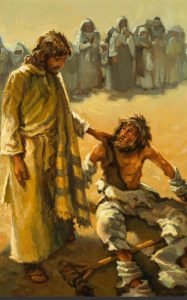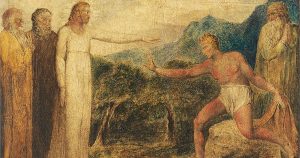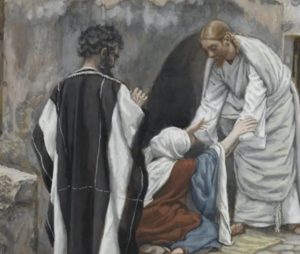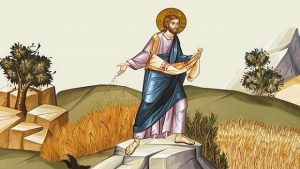Today is the 2nd Sunday of Lent. As we journey through Lent, it seems that there are so many things to learn from these readings. We focus on how we build and maintain a deeper relationship with God and know what those obstacles are that lead me away from God. St. Augustine, after his conversion, realized that the goodness of God is manifested through His creation, and it helped him find God’s love by appreciating the beauty of nature, the whole universe, and his remarkable understanding of God’s word. He discovered the true beauty of God by clinging to his new life with Him which led him to live in freedom under grace.
The first reading from the book of Genesis is a story about the testing of Abraham’s faith in God, that is, to offer his only son, Isaac, as his sacrificial offering ready to be slaughtered, but a messenger from heaven intercedes and Abraham is rewarded for his firm faith and obedience. The messenger from God tells Abraham, “ . . . because you acted as you did in not withholding from me your beloved son, I will bless you abundantly . . .” Our human mind cannot comprehend God’s way to test Abraham because it seemed that it caused him much anxiety, anguish, and stress. Many readers of this story feel that there is no need to test Abraham because God knows his heart, God knows how devoted he is to Him. Was the test for Abraham or for us? The test is certainly for us to understand completely that when we act on holding on to anything, even our most well-loved person, I believe that blessings wouldn’t be that great.
In the second reading from the letter to the Romans, St. Paul writes to the community that, “If God is for us, who can be against us?” It means that we do not defend ourselves from anybody’s condemnation but have God who is worth trusting. God’s presence with us is so great that we feel totally secure in Him. There is no need to
be afraid knowing that He is holding on to us constantly.
The gospel today narrates to us about Jesus’ transfiguration as witnessed by his three apostles, Peter, James, and John. During the transfiguration, Jesus was talking to Moses, representing the Law, and to Elijah, representing the prophets. The three apostles were delighted to see the appearance of Jesus radiant with light and his clothes dazzlingly white. They knew that Jesus had conversation with Moses and Elijah. They were called to believe, which challenged their knowing, and then to move on to a relationship walking back down the mountain in faith.
How many of us have realized what surfaced during that transfiguration in the life of Jesus as it relates to our Lenten journey?
First, this transfiguration in the life of our Lord is for us to take some time to reflect on God’s calling us for transformation. Is there anything holding us back from being open to the love of Christ which will transform us if we allow ourselves to witness and listen to Him? I believe that with our two senses, seeing Christ’s radiating light so that we could enlighten our path that leads to true life and the clarity of life’s purpose, and listening to Him in prayer so that our desire for the Word of God allows us to center on His Words. This kind of spirituality of Lent calls us to a faith and a listening which leads to our trusting God.
Second, Jesus’ transfiguration was an exceptional experience for the three apostles to witness His glorification and to give them hope. It also increases His disciples’ courage for what was to come. Hence, we receive the call to climb the mountain of transformation with Jesus, our Lord, which brings change, not only in our external appearances, but wholly able to change our interior life.
Third, as we descend from the mountain of transformation, let us share our faith stories with one another. We need to proclaim our experiences with God so that others may hear them. Maybe some people would appreciate our own perspective and grasp a different image of God. It is a grace though. In the scripture Jesus says, “charged them not to relate what they had seen to anyone,” which means it is not stopping us to say something but to wait until the “Son of God had risen from the dead.” I believe that the Resurrection of Jesus adds to the full understanding of the story of the Transfiguration of Christ. As believers, however, we need to confidently validate our faith in God and His continuous love for us as experienced by Abraham as well.
This season of Lent, we must acknowledge that we cannot transform ourselves alone. Jesus is the only one who can change us, for His grace is sufficiently given to us with our sincere cooperation. Let Abraham serve as our inspiration and model, the “Father of Faith to all Nations.” Just as Abraham was willing to offer his only son, Isaac, in the same manner, God, the Father Almighty, offered His only Son, Jesus Christ, so that the grace of salvation continues to flourish on earth, even up to this day, as God’s marvelous blessing!
God bless you.
Fr. Arlon, osa
—————————-
El Dictado del Corazón
Segundo Domingo de Cuaresma, Año B.
- Génesis 22:1-2, 9a, 10-13, 15-18
- Salmo 116:10, 15, 16-17, 18-19
- Romanos 8:31b-34
- Marcos 9:2-10
Hoy es el Segundo Domingo de Cuaresma. A medida que avanzamos en la Cuaresma, hay muchas cosas que aprender de estas lecturas. Nos enfocamos en cómo construimos y mantenemos una relación más profunda con Dios y sabemos cuáles son esos obstáculos que nos alejan de Dios. San Agustín, después de su conversión, se dio cuenta de que la bondad de Dios se manifiesta a través de Su creación y lo ayudó a encontrar el amor de Dios al apreciar la belleza de la naturaleza, el universo entero y su notable comprensión de la palabra de Dios. Descubrió la verdadera belleza de Dios aferrándose a su nueva vida con Él que lo llevó a vivir en libertad bajo la gracia.
La primera lectura del libro del Génesis es una historia sobre la prueba de la fe de Abraham en Dios, es decir, ofrecer a su único hijo, Isaac, como su ofrenda de sacrificio listo para ser sacrificado, pero un mensajero del cielo intercede y Abraham es recompensado por su firme obediencia y fe a Dios. El mensajero de Dios le dice a Abraham: “…. porque obraste como lo hiciste al no negarme a tu amado hijo, te bendeciré abundantemente. . .” Sin embargo, nuestra mente humana no puede comprender la manera en que Dios puso a prueba a Abraham porque parecía que le causaba mucha ansiedad, angustia y estrés. Muchos lectores de esta historia dicen que no hay necesidad de probar a Abraham porque Dios conoce su corazón, Dios sabe cuán devoto es para Él. ¿La prueba fue para Abraham o para nosotros? La prueba es ciertamente para nosotros, es que comprendamos completamente que cuando actuamos aferrándonos a cualquier cosa, incluso a nuestra persona más amada, creo que las bendiciones serían abundantes.
En la segunda lectura de la carta a los Romanos, San Pablo escribe a la comunidad: “Si Dios está a nuestro favor, ¿quién estará en contra nuestra?” Significa que no nos defendamos de la condenación de nadie, sino de tener esa imagen de Dios en la que vale la pena confiar. La presencia de Dios con nosotros es tan grande que nos sentimos totalmente seguros en Él. No hay por qué tener miedo sabiendo que Él se aferra a nosotros constantemente.
El evangelio de hoy nos narra la transfiguración de Jesús, presenciada por sus tres apóstoles, Pedro, Santiago y Juan. Durante la transfiguración, Jesús estaba hablando con Moisés, que representaba la Ley, y con Elías, que representaba a los profetas. Quedaron encantados al ver la aparición de Jesús radiante de luz y sus vestidos se volvieron de un blanco deslumbrante. Sabían que Jesús tuvo una conversación con Moisés y Elías. Fueron llamados a creer, lo que desafió su conocimiento, y luego pasar a una relación con Jesus, caminando de regreso de la montaña en fe.
¿Cuántos de nosotros nos hemos dado cuenta de lo que surge durante esa transfiguración en la vida de Jesús en relación con nuestra jornada en esta Cuaresma?
Primero, esta transfiguración en la vida de nuestro Señor es para que nos tomemos un tiempo para reflexionar sobre el llamado de Dios a la transformación. ¿Hay algo que nos impide estar abiertos al amor de Cristo, que nos transformará si nos permitimos testificarlo y escucharlo? Creo que nuestros dos sentidos, como ver la luz radiante de Cristo, podrían iluminar nuestro camino que conduce a la vida verdadera y a la claridad del propósito de la vida. Escucharlo en oración para que nuestro deseo por la Palabra de Dios nos permita centrarnos en Sus Palabras.
Este tipo de espiritualidad de la Cuaresma nos llama a la fe y a la escucha, lo que nos lleva a confiar en Dios.
En segundo lugar, la transfiguración de Jesús fue una experiencia excepcional para que los tres apóstoles fueran testigos de Su glorificación y tuvieran esperanza. También aumentó el valor de sus discípulos para lo que estaba por venir. Por eso, recibimos el llamado a escalar la montaña de la transformación con Jesús, nuestro Señor, que trae cambios no sólo en nuestras apariencias externas sino totalmente capaces de cambiar nuestra vida interior.
En tercer lugar, mientras descendemos de la montaña de la transformación, compartamos nuestra historia de fe unos con otros. Necesitamos proclamar nuestra experiencia con Dios para que otros puedan escucharlas. Quizás les ayuden a fortalecer su fe y puedan captar una imagen diferente de Dios. Aunque es una gracia. En la Escritura, Jesús les mandó que no contaran a nadie lo que habían visto, lo que significa que no nos impide hablar algo, sino esperar hasta que; “El Hijo de Dios haya resucitado de entre los muertos”. Creo que la Resurrección de Jesús contribuye a la comprensión completa de la historia de la Transfiguración de Cristo. Sin embargo, como creyentes, debemos validar con confianza nuestra fe en Dios y Su amor continuo por nosotros, como también lo experimentó Abraham.
En este tiempo de Cuaresma, debemos reconocer que no podemos transformarnos solos. Jesús es el único que puede transformarnos, porque su gracia nos es dada suficientemente con nuestra sincera cooperación. Dejemos que Abraham sirva como nuestra inspiración y modelo, el “Padre de la fe para todas las naciones”. Así como Abraham estuvo dispuesto a ofrecer a su único hijo, Isaac, de la misma manera Dios Padre Todopoderoso ofreció a su único Hijo, Jesucristo, para que la gracia de la salvación siga floreciendo en la tierra hasta el día de hoy, ¡como bendición maravillosa de Dios!
Dios los bendiga.
P. Arlón, osa




